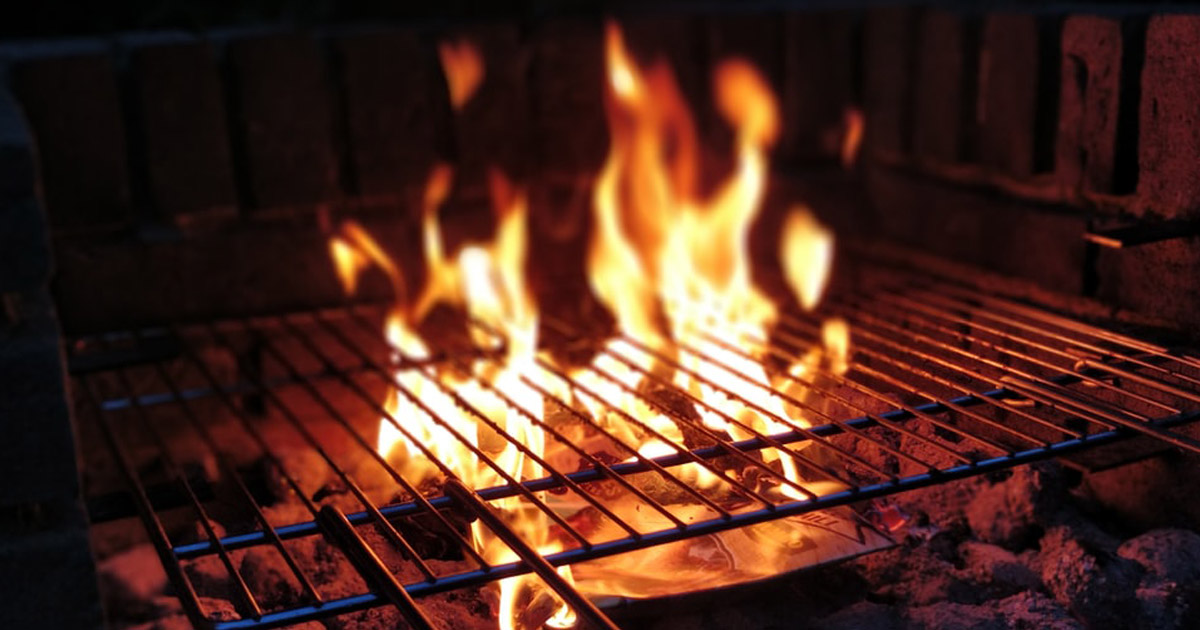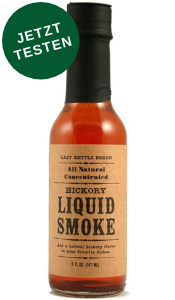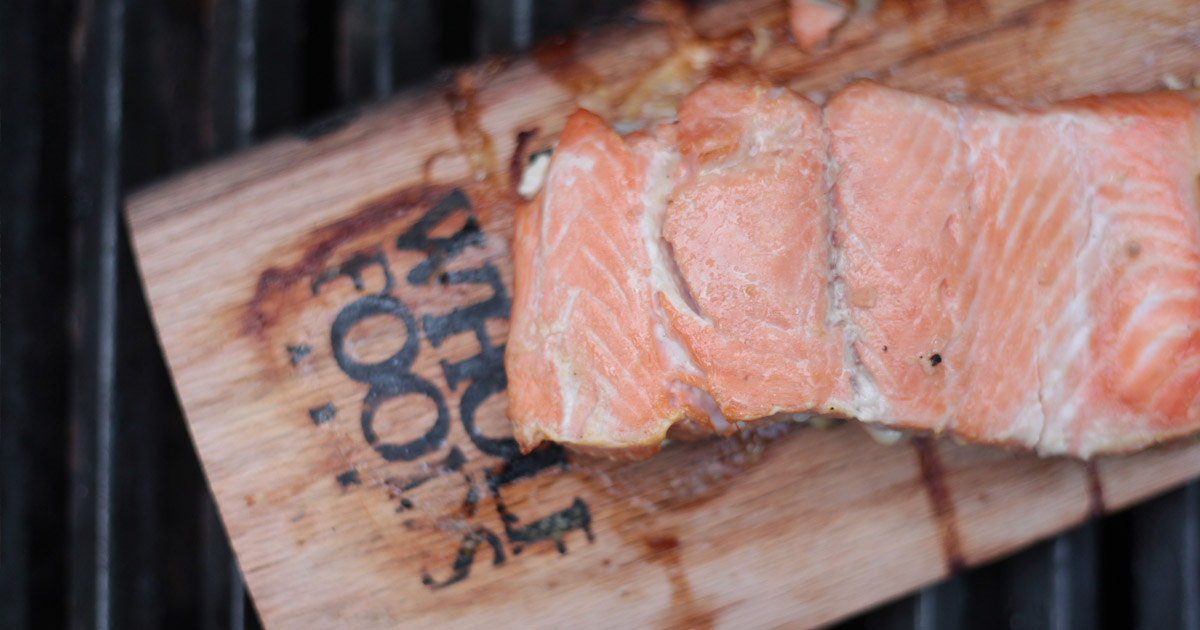Liquid Smoke – or as it's known in Germany – Flüssigrauch, is considered an absolute insider tip among barbecue enthusiasts in Europe. In the USA, the concept of smoke aroma from a bottle is much more popular and widely spread than it is here. However, the demand for liquid smoke is slowly increasing in the European region as well. Therefore, we want to draw attention to this trendy product from America and address important questions about liquid smoke. Among other things, we'll briefly touch on the history of Liquid Smoke, take a look at its production, provide valuable tips regarding dosage and storage of liquid smoke, and answer the question of whether liquid smoke is harmful to health.
First and foremost, let's clarify what exactly this Liquid Smoke is. Liquid smoke is, in a way, a bold and aromatic ingredient (not a sauce!) that can be used in cooking, frying, or grilling to give dishes a smoky barbecue flavor. It's particularly popular for all kinds of meat dishes, but it can also be easily used with fish, soups, and even cheese.
Production and Origin of Liquid Smoke
The origin of liquid smoke – unsurprisingly – lies in the USA. In the 19th century, American pharmacist Ernest H. Wright first had the idea to burn hickory wood, cool down and condense the resulting smoke, and then mix this condensate with water. The result was surprisingly good from a flavor perspective. With the help of a chemist, the method described above for extracting liquid smoke was developed and optimized, largely filtering out potentially harmful substances. At the end of the 20th century, specifically in 1985, pharmacist Wright patented the process of making liquid smoke, marking the birth of his product "Wright's Liquid Smoke."
Although there are very few manufacturers of liquid smoke worldwide, it's safe to say that almost everyone has consumed a product containing liquid smoke – often labeled as "smoke aroma".
Industrial use of liquid smoke is no longer a rarity either. This is due to several reasons. Firstly, the use of liquid smoke saves the industry costs and time. For example, ham and meat no longer need to undergo elaborate smoking processes. Even a smoking chamber, which is required for the smoking process, is no longer necessary due to the use of liquid smoke. Most products are sprayed with liquid smoke, giving them a pleasant smoky aroma.
Secondly, certain products are difficult or impossible to smoke. You've probably grabbed a bag of chips at the supermarket where the smoky flavor was predominant. Have you ever looked at the ingredient list? It's very likely that you saw "smoke aroma" there. Even the classic BBQ sauces, known for their smoky flavor, typically contain smoke aroma – often in the form of liquid smoke.
As you can see, liquid smoke (in the form of smoke aroma) is used in a variety of products, making it a part of our society, even if we haven't really noticed it until now.
Is Liquid Smoke Harmful to Health?
In times of artificial additives and flavor enhancers, which all have a bad reputation, it's quite natural to wonder whether flavors and similar additives are truly free from contaminants and safe for one's health. To answer this question, let's first take a look at the "real" smoke that imparts the distinct smoky taste to meat on the grill. Burning wood and charcoal produces polycyclic aromatic hydrocarbons (PAHs). These are classified as hazardous to health and the environment, as stated by the Federal Environment Agency. Smoke is – at least from a chemical perspective – very complex and dependent on numerous factors. Factors such as the oxygen concentration during smoking, the temperature, and even the type of wood used play a crucial role. The polycyclic aromatic hydrocarbons released during smoking typically find their way into the meat or product being smoked or grilled.
In the production of liquid smoke, the smoke generated by burning wood chips or sawdust undergoes a purification process. Harmful substances (such as PAHs) are extracted using multiple filters. As a result, the end product, liquid smoke, can be considered much less concerning than "regular smoke." Based on the current state of scientific knowledge, the question of whether liquid smoke is harmful to health can be answered with a resounding "no." In fact, one could even go so far as to claim that using liquid smoke is much healthier than using "natural" smoke, which contains health-threatening substances that transfer to the meat.
Where Can I Buy Liquid Smoke?
Although smoke aroma is found in many different products, obtaining liquid smoke – at least in retail stores – might not be so straightforward. With a bit of luck, you can find liquid smoke in well-stocked supermarkets or specialized barbecue stores. If you want to play it safe or prefer a wide selection, you can conveniently order liquid smoke online.
At American Heritage, we have included Liquid Smoke by Lazy Kettle Brand (imported from the USA) in our range, as we have very high standards of quality and taste – and this product (compared to those of other manufacturers) meets our requirements. This starts with the extremely clear and natural ingredient list, which contains only smoke aroma and water, and ends with the exceptionally authentic and intense smoky flavor due to the exclusive use of hickory and mesquite wood. Both types of wood contain the most potent smoky aromas and are thus perfect for liquid smoke.
If you're looking for a natural liquid smoke that is free from flavor enhancers, colorants, and other additives, while also delivering an intense smoky flavor, we highly recommend the Hickory Liquid Smoke by Lazy Kettle Brand. Feel free to experience it for yourself!
Liquid Smoke: Usage and Dosage
Liquid smoke finds various applications in the home kitchen. For instance, it can be used to add the necessary smoky kick to homemade barbecue sauce, resulting in an authentic taste experience. Be sure to pay attention to the dosage. You can follow this rule of thumb: For approximately one liter of sauce, you'll need about one teaspoon of liquid smoke.
Especially in cities, due to intense smoke production, it's often not allowed to grill with charcoal. However, even grill enthusiasts who have a fondness for the smoky flavor of meat & Co. can benefit from liquid smoke – even with an electric grill. Simply add a drop of liquid smoke to your meat marinade. Please try to keep the dosage as minimal as possible. If the desired smoky flavor is not intense enough, you can always add more liquid smoke afterwards.
Our "City Grilling" tip from Patrick Ryan, our grill expert who has appeared in several shows on Kabel 1, is directed at urban grill enthusiasts: Dilute the liquid smoke with some water (in a 1:2 ratio) and pour the mixture into a spray bottle. This way, you can spray meat in the oven or on an electric grill and still enjoy the characteristic smoky flavors of a charcoal grill.
Important Note: Liquid smoke is highly concentrated and should never be consumed undiluted. For most dishes, even a single drop is sufficient to achieve the desired smoky aroma.
Other Questions about Liquid Smoke Answered Briefly
Finally, we'd like to provide brief and concise answers to some questions about "Liquid Smoke" that we encounter repeatedly. If the questions haven't been answered adequately or to your satisfaction, please feel free to contact us!
What Should I Consider When Storing Liquid Smoke?
Once you've opened the liquid smoke, it's recommended to store it in a cool and dry place. Ideally, place the opened bottle in the refrigerator. While not mandatory, this is highly recommended, especially during warmer temperatures in the peak of summer.
Is Liquid Smoke Suitable for Vegans?
This question cannot be answered universally (unfortunately). There's a possibility that animal-derived fatty acids might be present in liquid smoke. In doubt, refer to the ingredient list. However, a natural liquid smoke, made solely from smoke aroma and water (like our Hickory Liquid Smoke by Lazy Kettle Brand), is entirely vegan and can be used without any issues by both vegetarians and vegans. Look for labels and search for wordings like "free from additional additives."
Can I Use Liquid Smoke to Smoke Foods?
This question can be answered relatively simply: no! Liquid smoke doesn't have a preserving effect on foods. Traditional smoking involves removing water from the food. As a result, the respective food lasts longer. On the other hand, liquid smoke is an aroma that cannot remove water from the food and therefore cannot make it more durable.





